A detailed and comprehensive operation, the SCMUA continuously looks for innovative solutions that will not only make operations more efficient, but also help them to ‘be a good neighbor ’and resource to the surrounding communities.
The Sussex County, NJ Municipal Utilities Authority (SCMUA) was formed in 1971 by the Sussex County Board of Chosen Freeholders during the time of the Federal Clean Water Act and Earth Day. People were starting to become more concerned about the environment, and the Authority’s primary charge was to clean up the waterways in Sussex County. In 1988, New Jersey mandated that Sussex County develop its own solid waste management plan. At the time, a privately (and locally) owned and operated landfill was reaching maximum capacity and the state did not want to expand the site, so the County was handed the responsibility of siting and operating a public solid waste disposal facility. The SCMUA implemented the site infrastructure, roads, water, buildings and the first equipment (roll-offs, compactors, etc.). Shortly after, the SCMUA built the first landfill cell and started landfilling in February 1990, starting with Phase 1A and 1B, then 2A, 2B and 3A. Currently landfilling on Phase 3B, they have done a number of horizontal and vertical extensions. SCMUA’s philosophy is that they built it for the county’s needs only, so that they can control their own destiny. “We are self-sufficient. Right now, we can manage our own solid waste through 2066, depending on a number of factors—recycling rates, population growth and what the regulations are going to be in 20 years, etc.,” says John Hatzelis, SCMUA Administrator.
The SCMUA is headed by a nine-person Board of Commissioners, and employs about 70 people, including wastewater, solid waste and central services staff.
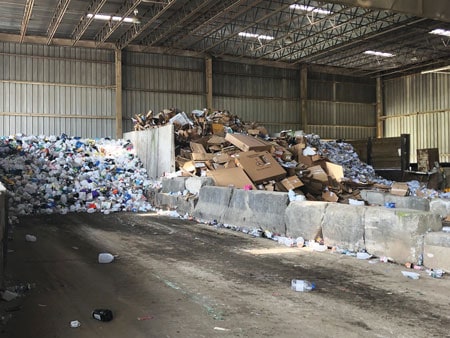
Landfill Operations
The majority of the material brought to the SCMUA facility is solid waste. The SCMUA facility has three different types of users, large commercial haulers, contractors and residential users. Commercial haulers use the landfill, while an adjacent location is designated as the Contractor Area to accommodate small dump trucks and trailers, keeping them out of the landfill. SCMUA staff provide assistance in unloading and proper sorting at its Residents’ Convenience and Recycling centers. The SCMUA Solid Waste/Recycling Facility services about 20,000 customers per month, totaling approximately 240,000 customers per year. While commercial haulers are the largest revenue stream, the second largest is the many residents that come for solid waste disposal and/or recycling. A number of county businesses bring in their own waste and recycling to avoid the costs of having to pay for a dumpster and hauler.
“The solid waste site uses a landfill compactor, a dozer, two track loaders, two-wheel loaders, an articulated dump truck, an excavator, a skid steer loader, a utility loader and two roll-offs. We also have three tractor trailers (two for hauling leachate out of the landfill to the wastewater treatment plant and one that is used to take recyclable commodities to market),” said SCMUA Solid Waste Superintendent Jonathan Morris.
In dealing with in-bound solid waste volumes of about 350 tons per day (approximately 105,000 tons per year), at the end of each day the garbage and debris is leveled off and the tarping system is hooked onto the front of the compactor, the tarps are rolled over the active working face, so they do not have to use cover dirt every day. In the morning when the operators come in, they roll them back up again and continue. Says Hatzelis, “We were using clean soil, and then when we started using the tarping system, the state was wary of the solution. However, once they found out how efficient it was, they started using the SCMUA facility as an example to other counties. We currently have an approval to use it as an alternative daily cover, which means we can go Saturday to Monday (up to 72 hours) without having to put an extra six inches of cover on the landfill, which also saves space.”
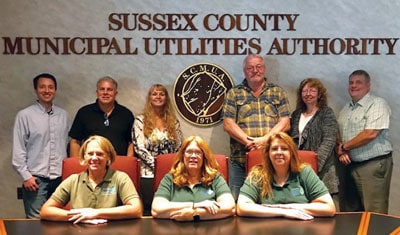
Tom Varro, Executive Director and Chief Engineer, agrees. “When I first started here in 2002, we were approved for tarps, but we were pulling them by hand each day on and off, making it labor intensive, resulting in injuries and it took a long time to do. The switch to an automatic tarping system was one of the best things that we have done.”
Currently, the first cells (1A and 1B) are closed and sealed off, triple lined underneath and capped with a landfill gas collection system. The Authority has its own flare and blower system to manage the gas. A landfill gas-to-energy facility is operated onsite by a private entity, with two large generators transforming the gas into electricity and the agencies have a profit share agreement. “The Borgata Hotel and Casino in Atlantic City actually uses the energy credits from the SCMUA Landfill, to offset the electricity used at their hotel,” says Hatzelis.
The landfill gas collection system is maintained on a regular basis by SCMUA staff to optimize and maintain the system. With both permanent and temporary capping in place and, with expansion plans approved and in phase, the Authority is planning on implementing a third blower as backup. Explains Varro, “We keep the landfill at a constant vacuum of about 40 inches; that is the draw from the landfill at all times. With our recent expansion and additional wells, we are collecting more than 1,000 cubic square feet per minute of landfill gas. The vendor’s landfill gas-to-energy plant is sized for 3.2 megawatts.”
Landfill Capacity
Varro explains that the general economy has an affect on solid waste generation. When there is a recession, the facility sees a tonnage drop off since people are not buying and replacing products; therefore, they are not as quick to dispose of items. There is also less construction related activity. Hatzelis observes that the uptick in solid waste tonnage has stayed steady because the economy has been improving. “There were a lot of foreclosures in New Jersey in 2008, resulting in a population drop. Financially it was not good for us because the tonnage and revenue also dropped off. However, things have started to turn around in the last three to four years.”
Not only has the facility had to deal with the volatility of the economy, but aslso in 2013 the site was set to close because the landfill was approaching capacity. The SCMUA conservatively did not hire any new employees or update equipment during that time. Although, they were able to do some expansion and vertical extension when they constructed phases 3A and 3B of the landfill, it only marginally extended the landfill life to about 2020. Looking for a solution, SCMUA considered a relatively new technology where you could build Mechanically Stabilized Earthen (MSE) Berms around the landfill so you can go higher and increase landfill life significantly. Varro explains, “We were trying to come up with a plan regarding future solid waste disposal in Sussex County, and were limited onsite due to preserved wetlands and a wildlife mitigation area. This solution addressed a lot of problems. Now, our landfill life has been extended through 2066. Using MSE Berm construction, you are creating a substantial amount of additional volume that is usable, so it makes current and future landfill expansions much more cost effective. Implemented in December 2017, it has made a big difference in continuing our mission of cost-effective and environmentally sound solid waste and recycling management.”
A 25+ Year Career at SCMUA
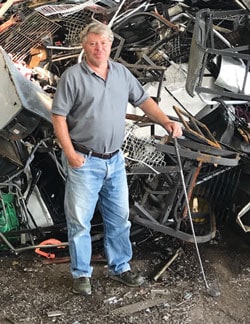 The Sussex County MUA would like to congratulate our Administrator John Hatzelis on his upcoming retirement! John’s 28 years as Administrator to the SCMUA Wastewater and Solid Waste facilities has been an asset to the operations and staff, with his hard work and diligence greatly benefiting the residents and businesses of Sussex County.
The Sussex County MUA would like to congratulate our Administrator John Hatzelis on his upcoming retirement! John’s 28 years as Administrator to the SCMUA Wastewater and Solid Waste facilities has been an asset to the operations and staff, with his hard work and diligence greatly benefiting the residents and businesses of Sussex County.
John has always embraced the importance of public service, first as a Veteran in the Armed Forces in the mid 1970s, then seeking ever-challenging government positions in Sussex County as an Office Manager for seven years at the Department of Engineering & Highways, Chief of Administrative Services at the County Homestead Assisted Living Facility for five years, and finally as Administrator at the SCMUA for the last 28 years.
John’s educational endeavors have supported his trajectory regarding infrastructure management and quest to better his community, with a B.S. in Public Administration, and various certifications in Financial Management and Purchasing.
John also has made time for civic involvement in various local organizations, including 25 years as Commissioner for the Statewide Insurance Fund, Commissioner for the Sussex County Crime Stoppers, long-time member of the American Legion Post 86 and Treasurer to the Lake Iliff Community Club, also a Committee Member for the John Cocula Memorial Scholarship Fund and certified with the Andover Township Community Emergency Response Team (CERT).
After 40+ years doing for others, John certainly deserves some time to himself! While his open door and roll up the sleeves attitude will be missed by all of the SCMUA, the remaining staff will strive to follow his stellar example.
The Board of Commissioners has named Tom Varro, SCMUA Chief Engineer for 17 years, as Executive Director to take over the helm and lead Sussex County’s wastewater and solid waste public services into the future.
The Future of Leachate
Generating around 13 million gallons of leachate each year from the landfill, facility tanker trucks haul 6,000 gallons per load, making more than 2,000 trips per year. Comments Morris, “On an eight-hour day, two trucks typically make six trips, moving 72,000 gallons per day.” This means a lot of risk going back and forth six miles to the SCMUA wastewater treatment plant for treatment and disposal. As a result, the current plan is to discontinue hauling the leachate and build a pump station and force main to go to the wastewater treatment plant in order to get the vehicles off the road. Says Varro, “We are ready to start implementing it now, however we are still going through the design and permit process, and then it will go out to bid for construction. We are looking at getting it ready for bidding by the end of this year. Once construction starts, it will take about 12 months to complete.”
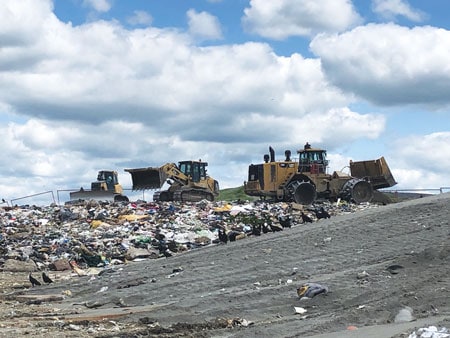
Keeping on Top of Continuing Challenges
Labor shortage is one of the big challenges that the SCMUA has to deal with, as it is tough to find good people and train them. Staffing of qualified personnel is an ongoing issue. “Solid waste disposal is a great business to be in, but it has taken a long time to bring in the necessary personnel and we are always looking for different recruiting sources Every 15 to 20 years, we see a shortage wave as a result of staff retiring and trying to recruit the next generation of employees,” says Hatzelis.
As a result, the SCMUA is transitioning to a personnel grouping of mixed qualifications and experience, so the Authority promotes cross-training within its workforce. Obtaining CDL’s, SWANA certifications or other licensures/qualifications is highly encouraged, and supervisors assist in on-the-job training, so employees can move up the organizational structure.
In addition, the site augments staffing with seasonal (summer) hires. Some of these employees do stay or return and become long-term employees. “Many people come here thinking they do not want to be in the waste business—that this is a part-time job. Those who realize the infrastructure and how they can actually build their careers staying here and are willing to learn, have done really well with it,” says Recycling Coordinator, Reenee Casapulla.
Another challenge on the solid waste side has been odors. The SCMUA is constantly looking to stay ahead of the curve in terms of managing the landfill gas. The SCMUA has invested in both the necessary landfill gas infrastructure and also qualified in-house personnel (SWANA-certified), which has resulted in optimized operations. “Typically, people in our surrounding community will be understanding if there is an occasional sporadic odor one day, but if it persists, they get less tolerant. Even though our site is in a rural location, we do have people that have houses right on our border and not too far away there is an outdoor shopping mall. So, it is a concern if we get complaints,” says Morris. Varro adds, “Each year we assess the system and identify what improvements can be made. The winter is an especially hard time because of climate conditions whereby stagnant cold air pushes everything outward. Right now, we are in preparation in case we run into problems later this year. We are always trying to be proactive and are currently doing a pilot test of remedial measures we can perform to neutralize any odors. One of the odor control products we’ve been looking at seems to be getting some favorable results. We live and work in the community, so we are trying to be a good neighbor for our surrounding customers.”
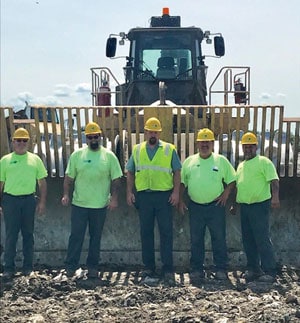
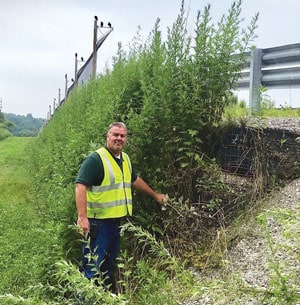
Landfill.
Safety and Maintenance
Safety is #1 at SCMUA. All employees wear steel-toed boots, highly visible shirts and vests and other protective equipment during the workday. The SCMUA has guidance and oversight on any new safety regulations or changes in training through their cooperative insurance group Statewide Insurance Fund, where Hatzelis sits on the board. The Fund provides certain services to public entities, implementing safety programs and works with staff to do job related training. From the moment an employee is hired, they go through a safety orientation and the SCMUA provides the required PEOSHA training on a regular basis. “We do toolbox training, which is site specific depending on what they are dealing with, including access to different parts of the facility, awareness with the public, more of a comprehensive overview. We also address equipment, PPE and reporting as well. Everything is hands on. We make sure we have good gloves and accessible tools to help keep our workers safe. We aim for regular safety meetings; if we need more specialized training in between, we’ll focus on that,” stresses Casapulla.
“The most effective thing is that when there is a safety incident or accident, it is reported and documented. Just because it was a close call doesn’t mean that it won’t happen again,” says Morris. “Our supervisors are constantly looking out for our employees. After an incident, we have a discussion and a toolbox training session to talk with employees about what happened. We stress that: If you see something, address it right away.”
When it comes to maintenance, the SCMUA has great mechanics that maintain most of the equipment onsite with daily checks and necessary repairs. They come in early every day, go out to the landfill, check all the equipment and start it up, so that at 6:30 a.m. when the operators come in, they can go right to work. They also check the rolling stock—compactors, loaders, etc. Since the site does not have the luxury of multiple backup equipment, they have to make sure that they efficiently maintain the current equipment inventory. “We are thinking long-term. If you have skilled operators, there is less chance of a breakdown. If you have skilled maintenance staff who keeps up with oil and filter changes, etc. when they are due, the equipment will last a longer time. Drivers are also required to check their equipment before they go out on the road,” says Hatzelis.
Residents for Recycling
At the SCMUA’s Convenience Center, residents can bring in their bagged garbage for a disposal charge. Offering a valet type service, SCMUA staff assists customers unload their bagged garbage and bulky solid waste, then separate any recyclable items into designated boxes. A lot of wood waste, mattresses and bulky material comes through the center. Recycling diversion includes: electronics, TVs, wires, cardboard, mixed fiber, newspaper, propane tanks, packaging Styrofoam, tires, rigid plastic and lead acid batteries. At the end of the day, the recyclable material is packaged/wrapped and brought to the designated areas, where it is stored until shipped out.
At the Resident’s Recycling Center, the SCMUA provides collection containers for residents and businesses to bring source-separated recyclable material, at no charge.
Fiber is separated into newspaper, mixed fiber and cardboard, while bottles and cans be commingled glass, plastic, metal and drink cartons. However, the SCMUA does not accept single-stream recyclable material at its facility. According to Hatzelis, the SCMUA is fortunate that it did not transition to single stream. Because they deal with multi-stream materials, they have a cleaner product, so there are more opportunities to market their product. “Our staff spends a lot of time monitoring what comes in to the facility on a daily basis. It is stressed to staff and customers the importance of keeping the materials cleaner for market value purposes.”
The SCMUA also offers a Packaging “Styrofoam” drop-off area at the Recycling Center, for the collection of Expanded Polystyrene (EPS) packaging material. SCMUA staff had noted that the foam had become a more visible material being disposed of at the landfill, so they partnered with Foam Cycle, LLC to implement an innovative container recycling system to collect, densify and re-purpose the EPS, all within New Jersey. This system has been seamlessly integrated into operations of the SCMUA facility, with more than 28,000 pounds of packaging EPS diverted from the landfill and processed for recycling, since the program started in October 2016. The condensed EPS is then sold and shipped to an end user molding manufacturer, also within New Jersey. From an economic perspective, the packaging EPS recycling program has been successful for the SCMUA in saving limited landfill space by diverting a former waste material and generating a revenue stream by marketing high quality processed material. Providing a packaging EPS recycling program has been a welcome addition to the existing range of services for SCMUA customers.
The Residents’ Recycling Center owes its success, in large part, to the many residents and businesses of Sussex County who recognize that recycling is a necessary and beneficial solid waste management option. Recycling is a cost-effective activity that conserves natural resources and extends landfill life, with the public’s participation each and every day.
The SCMUA hosts a number of recycling programs, partnering with private vendors. Since 2002 the SCMUA has been providing responsible disposal of consumer electronics (e-waste), for Sussex County. The SCMUA has a two-pronged approach to managing e-waste at the Solid Waste/Recycling Facility in an effort to prevent it being landfilled. On a daily basis, SCMUA employees segregate e-waste from the solid waste stream while assisting customers at the Residents’ Convenience Center. Additionally, the SCMUA hosts four E-Waste Collection Events each year at no charge to residents. They have also hosted two Household Hazardous Waste Collection Events on an annual basis, for more than 25 years. All of the county’s hazardous waste is properly disposed (or recycled) by a contracted vendor, thereby protecting both the SCMUA landfill and the environment from contamination. For more than 13 years, the SCMUA has contracted with a local secure document destruction company to offer residents and business owners a monthly secure and convenient paper shredding service, with the byproduct being recycled. The SCMUA also provides a monthly drop-off location for the proper disposal/destruction of sharps and regulated medical waste from home generators and for the safety of landfill staff.
The SCMUA also offers a Vegetative Waste management program, including drop-off for brush, leaves and yard waste. The brush is ground into mulch, with some material double ground and dyed, available for a nominal loading fee. Leaves, grass and vegetative waste is composted using a windrow turner. Unscreened compost is available to residents for no charge and is also used it to stabilize the landfill slopes.
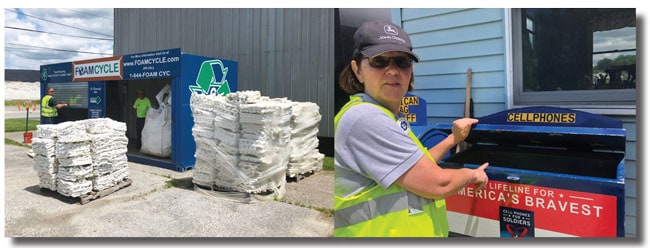
Right: Reenee Casapulla explains how the SCMUA participates in the Cell Phones for Soldiers program.
Patriotic Recycling Initiatives
At the Recycling Center the SCMUA partners with a textile recycler to collect household items and clothing. “One of the boxes is dedicated to funding the Northern New Jersey Veteran’s cemetery and one for the Sussex County Crime Stoppers law enforcement association,” explains Casapulla.
The SCMUA also participates in a Cell Phones for Soldiers program, where residents can drop off old phones that are recycled. The proceeds from recycling the cell phones goes to calling cards for soldiers stationed overseas so they can call their families. One of the site employees, Ben Wilson, maintains the boxes and it is filled regularly. “It is an amazing program,” comments Casapulla. “We do about 250 pounds of cell phones this way, without even really promoting it.”
The SCMUA also has a unique American Flag retirement program for used flags that are no longer suitable for display. It was a challenge to find a proper disposal solution for the large quantity of flags, in the excess of 800 pounds annually, brought to the Recycling Center by Sussex County residents and businesses. Previously, the flags were stored and brought to a local American Legion Post for their annual Flag Retirement ceremony. With many flags now typically being made of nylon or polyester-based fabrics, the potential air and health hazards associated with burning the non-cotton flags has been a deterrent from conducting the traditional open pit burning of the flags. Abbey Glen Pet Memorial Park generously offered using their crematory at no charge to provide a proper and environmentally sound method to retire the flags. The NJDEP Division of Air and Hazardous Materials Enforcement issued an approval to the Abbey Glen Pet Memorial Park to combust the flags in a proper and respectful manner—the first of its kind statewide. Now, an annual Flag Retirement ceremony is conducted with representatives from Boy Scout and Girl Scout Troops, American Legions and Veteran’s organizations, along with local, county and state officials. As a result of this program, more than 4,000 pounds of flags collected at the SCMUA Recycling Center have been properly retired and incinerated under State and American Legion guidelines. The flag ashes have also been retired in a place of honor at the Northern New Jersey Veterans Memorial Cemetery in Sparta, NJ.
Community Outreach
The SCMUA participates in community outreach, hosting tours from college students, high school groups, boy scouts, civic groups and others in the community. They provide speaking engagements regarding solid waste and recycling management, upon request, to civic groups such as the American Legion, Rotary, County Economic Development Committee, etc.
As a way to promote environmental stewardship and spread valuable educational information about proper solid waste disposal and recycling, the SCMUA and the Wallkill River Watershed Management Program host an annual Earth-Energy Day Event, celebrating its 15th year this coming April. Sussex County residents and schools participate in activities designed to raise awareness of environmental issues such as hazardous waste management, recycling, watershed management, alternative energy, protection of natural resources and other educational activities. Students from various Sussex County schools take part in the day “Our facility engineers and vendors show the students what a landfill liner looks like and talk about leachate and water quality, recycling, methane collection, etc. The kids get a real good understanding of their landfill. They come here thinking it is going to be a smelly dump and afterwards they write us these great Thank You letters about what they learned and how they loved the visit,” says Casapulla.
Working Together
The SCMUA is very proud of the fact that not only has there been no recent major safety incidents, but they are also going on 30 years of handling the solid waste of Sussex County with no major issues from the DEP or local population. Says Varro, “Everyone who works here knows their job and does it well. With the amount of traffic, 20,000 customers per month, 240,000 per year, that is a lot of potential for complaints. Every once in a while, you get someone that wasn’t happy, but for the most part, we get a lot of positive feedback, like ‘I love this place’, ‘I go here every Saturday’, ‘The guys are helpful’, etc. That is part of what we do as a service to the county and I think we’ve worked hard to get the staff trained and motivated.”
Hatzelis agrees, “We have key people that do a great job. Whether we recruit from outside or train from within, we’ve been able to find and place people in the right spots and ensure that everything runs smoothly—from our maintenance staff, to our gas technician, our supervisors out in the landfill and at the convenience area as well and other parts of the facility.”
A Master Plan
Currently, Varro, Morris and several of the SCMUA Commissioners are working on a master solid waste development plan to get the operation from today to 2066. To be completed later this year, it will involve the development of future phases for the landfill, what facilities and infrastructure needs to be moved and in what order. “It is basically a big jigsaw puzzle because if we want to expand the landfill in one direction, we have to change the infrastructure (wells, leachate storage, pump systems, residence convenience center, composting, etc.). We don’t have a lot of room, so everything has to be done in a coordinated effort,” explains Varro.
Says Casapulla, “I am proud of how we represent Sussex County. Our site is small as far as a landfill goes and we are in a rural community in a very densely populated state, but at the same time, we work together with our Commissioners to represent our county whereas other areas don’t have that opportunity. It is great being part of the process.” | WA
For more information, contact Thomas Varro, P.E., SCMUA Executive Director, at [email protected].
